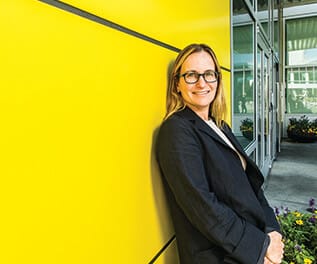Of all the big names and powerful personalities involved in the resurrection of tech titan Yahoo, Jacqueline D. Reses, W’92, is right up there. As chief development officer, she has been tasked with growing the company from within and without. As a result of these efforts, the company has an entirely new executive team, the attrition rate of employees leaving the company voluntarily is down 59 percent and resumes are peaking at more than 12,000 per week. We talked with her about her own professional and personal experience as a leader.
WHARTON MAGAZINE: What does leadership mean to you?
JACKIE RESES: The notion of leadership is complex. Leadership means making the decisions without a full view of all the facts you’d like to have; it means being good enough to earn the respect of those who are following your lead; it means driving team performance to be better than the sum of the individuals.
Leadership is an honor bestowed upon you, and you better be ready for it. You better be willing and able to earn the respect of those whom you are leading.
WM: You have been in positions of authority before and came to Yahoo well-respected in private equity. Still, was there a steep leadership learning curve in your new role?
RESES: Domain expertise associated with the talent group was probably my steepest learning curve. While hiring, promoting and compensating talent was always an important part of my role in private equity, I’ve never actually run an HR team before. So I had a lot to learn with the specifics of how the function operated at Yahoo.
During this period of growth, HR is integral to Yahoo’s success. Companies with the best talent win, and my team is in charge of ensuring that that talent comes to Yahoo and stays there and enjoys a gratifying career at the company.
WM: What would you say has been your biggest accomplishment to date at Yahoo?
RESES: We have had a busy year. We’ve executed 22 acquisitions since I started. We’ve hired more than 2,000 people, including a group of world-class leaders. Overall, more people want to work at Yahoo, and less people are leaving to work elsewhere. There are so many differences between now and a year ago it’s hard to pick out only a few highlights. However, I will say that all of these changes have resulted in a renewed sense of energy.
WM: Do you see yourself as a role model in general or to women?
RESES: I’ve always cared about making sure that women in finance feel like the industry was open to them. I was a role model and voice of that community, particularly in private equity where there were so few women.
At Yahoo, I don’t really think about it so much because of the diversity of our executive team. It’s become a non-issue for the first time in my career.
WM: Ever Google yourself to see what people are saying?
RESES: If I did, I would use Yahoo Search.
WM: How do you view your own work-life balance?
RESES: I think of my personal and professional life as one. I have always been blessed with work colleagues and relationships that are both for me. As for my family, I always prioritize the events and moments that matter. I don’t always do that well, but I try.
WM: When you crafted the “work from work” memo for Yahoo employees, did you expect it to have a mass culture response?
RESES: The memo you refer to was an internal memo to our employees. We weren’t making a cultural statement about telecommuting—we were focused on what was right for Yahoo. Our goal is to drive innovation, and we see more success where teams are co-located. When I look back at all of the amazing progress our teams have made over the past 12 months, it is clear that this was the right decision for Yahoo.
And we’ve gotten a lot of positive feedback from employees as a result of the renewed energy and collaboration inside the company.
WM: What did you think about the size and the response to the memo when it went public?
RESES: I was surprised by it, and how it became a public debate about telecommuting and also women’s flexibility to work from home.
We were focused on the outcome at Yahoo and not what was being debated publically. We recognize that there are times when working from home can be more productive, but when you’re focused on innovation and lightening-speed execution, it’s always better when teams can work together.
WM: One of the accolades you’ve recently received was “a most influential woman.” How do you see yourself?
RESES: I think you reach a point in your career where your influence is based on the impact you have on your teams and the people around you. I come to work every day and do my best to focus on excellence.
I hope that means that I do make a positive impact on the people I work with.
Editor’s note: Read more about Wharton women and leadership and access the five other individual Q&As in our cover article, “On, About & For More Leadership.”


























